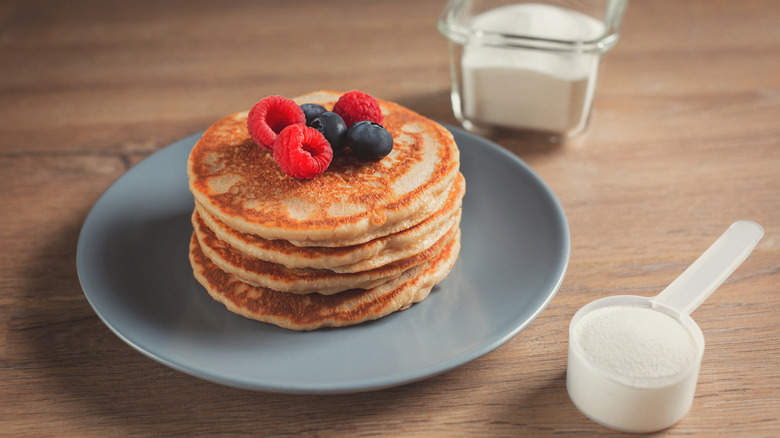How To Pick The Right Whey Protein Powder For Weight Loss
Getting plenty of protein can be beneficial during your weight loss efforts. For example, Healthline writes that protein reduces your level of the hunger hormone ghrelin while simultaneously increasing hormones like GLP-1 (the same hormone associated with drugs like Ozempic and Wegovy), peptide YY, and cholecystokinin. Adequate protein is also essential to prevent muscle wasting. It's possible to lose 11% to 50% of your muscle mass during weight loss (per Abbott). However, muscle loss can contribute to a slowed metabolism, which is something you don't want when attempting to shed pounds.
In order to get enough protein, dieters will often turn to supplements like whey protein. But whey protein comes in a few different forms, so it can be confusing to decide which one to buy (here's the big difference between whey protein and plant-based protein). Is there a particular form that works best for weight loss? To get answers, Health Digest spoke with Matthew Pikosky, Ph.D., R.D., Vice President of Nutrition Research at National Dairy Council.
The best type of whey protein for weight loss is the one you prefer
Pikosky said there's really no meaningful difference between the various types of whey protein when it comes to managing and losing weight, so choose whatever type you prefer, whether it's in the form of concentrate, isolate, or hydrolysate. "While a whey hydrolysate may be reported to have slightly higher digestibility vs. a concentrate or isolate, along with a faster rate of digestion, these differences may be too small to make a significant impact on real-world health benefits as all whey proteins are highly digestible (~≥95% digestibility) and rapidly digested and absorbed," he said.
Factors that you may want to consider, however, include the number of calories, whether you're sensitive to lactose, and how they taste. Isolates and hydrolysates have slightly fewer calories, according to Pikosky. But if lactose is an issue for you, stick with an isolate rather than a concentrate. Taste and mouthfeel can also vary between an isolate and a concentrate due to their relative lactose, fat, and mineral content.
"Food manufacturers often will choose between the different types of whey protein based on how it performs in a given format or application based on these subtle differences (e.g., a bar vs. a beverage)," said Pikosky. That said, if you're buying the powdered form for your own use, you may need to experiment to see which you like best.
How to consume whey protein for weight loss
Pikosky pointed out that while smoothies are many people's go-to for consuming whey protein, he suggests getting creative and experimenting. For example, try mixing it in with your morning oatmeal or pancakes for an added protein boost. "Once consumers start experimenting and/or trying the variety of options now available, they will be surprised by the number of great-tasting options!" he said. If weight loss is your goal, however, do keep calories in mind.
One caveat to bear in mind, according to Pikosky, is that whey protein is a dietary supplement and, therefore, not regulated in the same way as foods and beverages. Pikosky advises that consumers stick with products that are third-party certified by an independent lab. "NSF Certified for Sport is a recognized, credible resource that certifies what is on the label is in the package and that the product does not contain unsafe levels of contaminants, prohibited substances, or masking agents," said Pikosky. "Another credible resource is Informed Choice."


